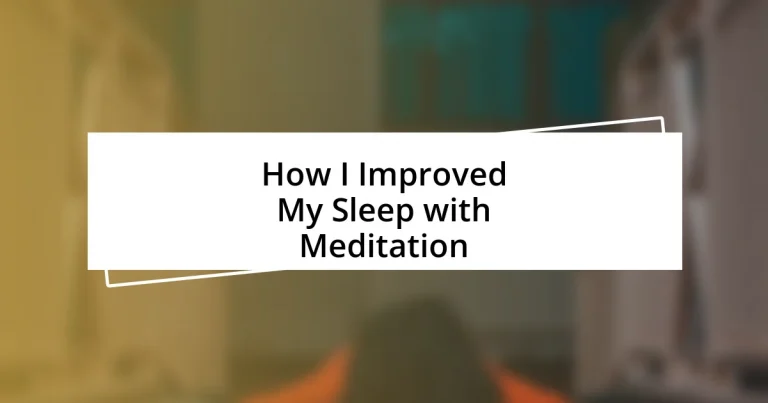Key takeaways:
- Sleep is vital for well-being, influencing mood, memory, and overall health; chronic sleep issues can lead to long-term problems.
- Meditation effectively enhances sleep quality by reducing stress, improving focus, and promoting emotional regulation.
- Tracking sleep patterns and establishing a consistent meditation routine provides valuable insights and fosters long-term improvements in sleep and daily mindfulness.
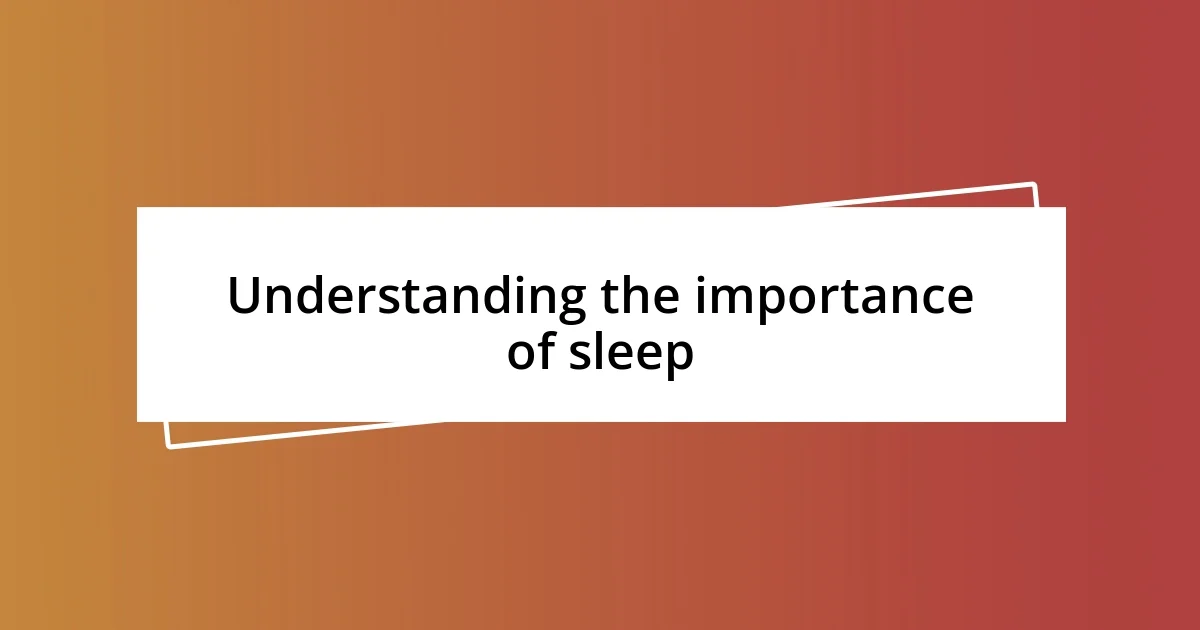
Understanding the importance of sleep
Sleep truly acts as the foundation of our overall well-being. I know from personal experience that a good night’s rest effects my mood and energy levels throughout the day. Have you ever noticed how even slight sleep deprivation can make you irritable or unfocused?
It’s fascinating how many functions of our body rely on sleep. For example, I’ve learned that sleep plays a crucial role in memory consolidation, which is why I often feel foggy after a night of tossing and turning. Isn’t it amazing that something as simple as rest can enhance our cognitive abilities and even boost creativity?
During my rough patches, I realized that chronic sleep issues not only affect productivity but also contribute to long-term health problems. I sometimes found myself worrying about how my sleepless nights would impact my future. Can we really afford to underestimate the powerful role that sleep plays in shaping our lives?
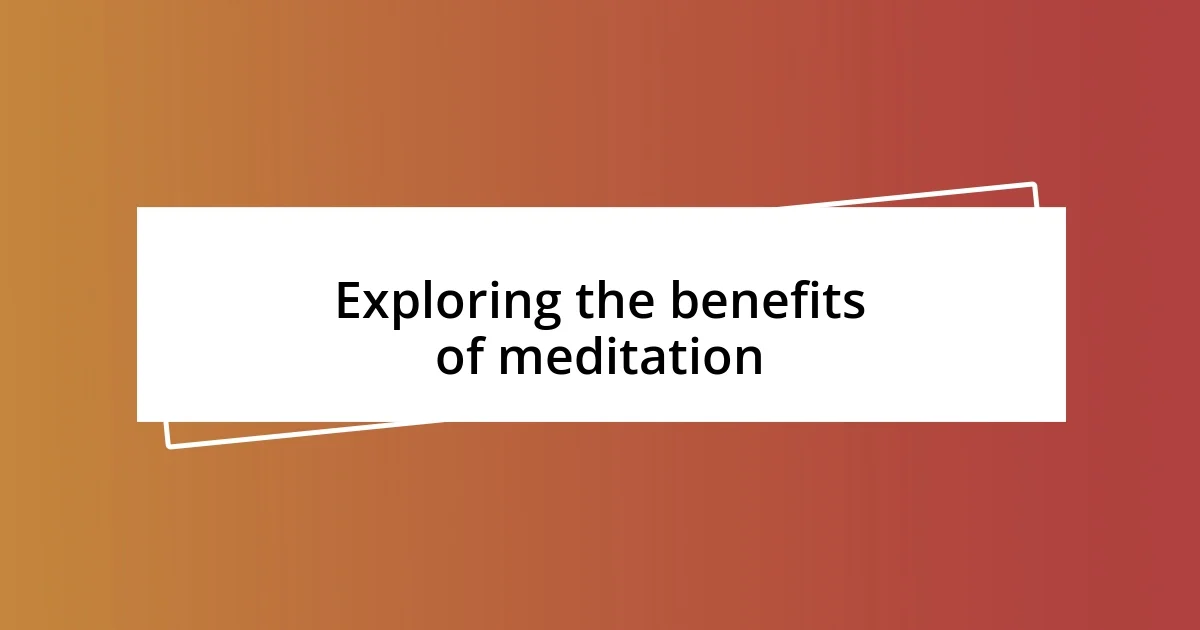
Exploring the benefits of meditation
Meditation has a remarkable ability to enhance various aspects of life, especially when it comes to improving sleep quality. Personally, I’ve discovered that incorporating short meditation sessions into my routine not only calms my racing thoughts but also prepares my mind for a restful slumber. The simplicity of focusing on my breath or visualizing a serene scene has transformed my nights dramatically.
The benefits of meditation are numerous:
- Reduced Stress: Helps alleviate anxiety and tension, making it easier to relax before sleep.
- Improved Focus: Encourages mindfulness, allowing for clearer thoughts and reduced mental clutter.
- Better Emotional Regulation: Aids in managing emotions, which can lead to a calmer mindset at bedtime.
- Enhanced Sleep Quality: Studies suggest that regular meditation can improve both the time it takes to fall asleep and the quality of sleep itself.
When I adopted meditation, I noticed how it shifted not just my evenings but my overall approach to stress. There were nights where my mind would race about the day’s events, but now I gently guide my thoughts back to my breath. It’s like pressing a reset button on my brain! Have you ever tried something so simple yet so impactful?
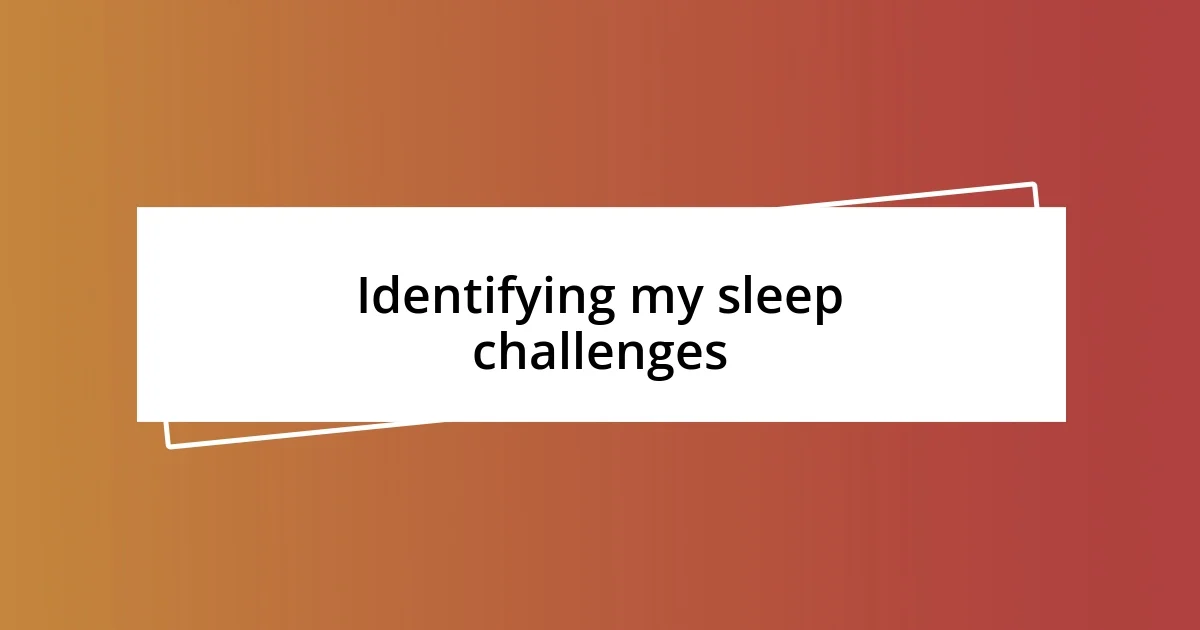
Identifying my sleep challenges
Identifying the sleep challenges I faced was a crucial first step toward finding a solution. To be honest, I started to notice patterns in my sleep habits that didn’t sit well with me. Waking up multiple times during the night or staring at the ceiling for endless minutes became all too common, and I knew I had to dig deeper into what was causing these disturbances in my rest.
One particularly frustrating realization was how much my mind raced at bedtime. I remember lying there, thinking about everything from the day’s events to future worries. It was almost like my brain had a life of its own, churning through thoughts while my body craved rest. A friend once told me that this overactive mind can stem from unresolved stress, which made me wonder how many others shared the same struggle to quiet their thoughts at night.
Reflecting on my sleep environment also played a key role in identifying my challenges. I realized factors like screen time before bed and a cluttered bedroom created obstacles for restful sleep. Once I acknowledged these elements, I felt ready to tackle them head-on. By focusing on both my inner thoughts and my surroundings, I began to see a clearer picture of what stood in the way of a good night’s sleep.
| Challenge | Description |
|---|---|
| Racing Thoughts | Overactive mind caused by daily stressors, making it hard to fall asleep. |
| Frequent Wake-ups | Waking up multiple times during the night, disrupting sleep cycles. |
| Poor Sleep Environment | Factors like screen time and clutter affecting sleep quality. |
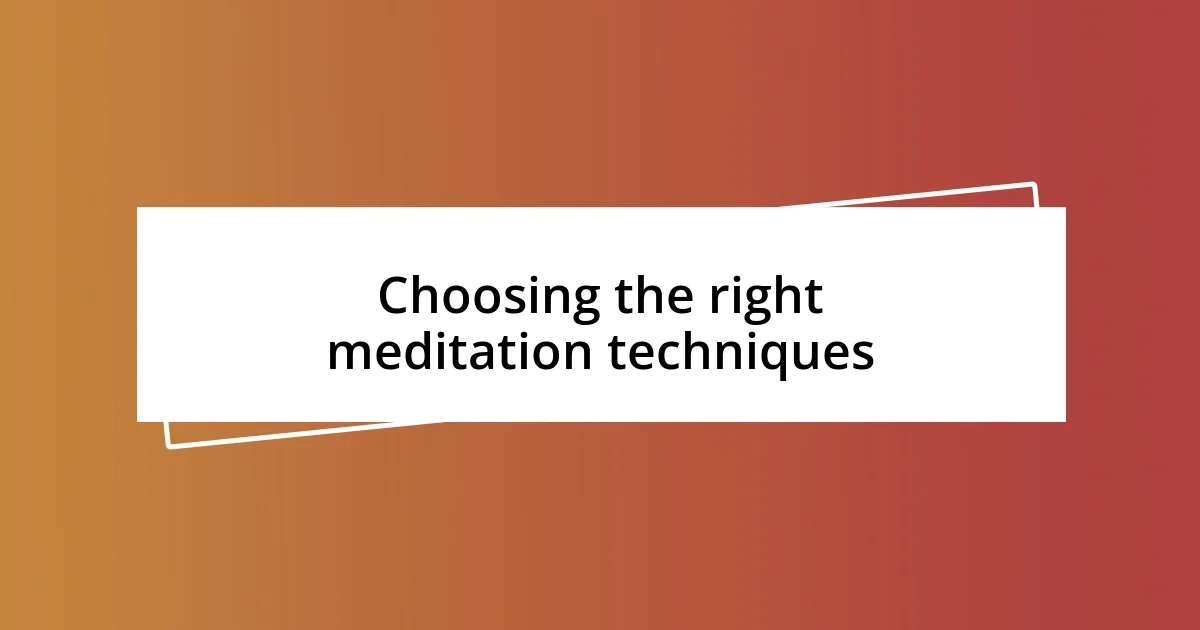
Choosing the right meditation techniques
Choosing the right meditation techniques can feel overwhelming, especially with so many options available. I remember standing in front of a sea of methods, wondering which would resonate with me, and it took some trial and error to find what truly worked. Exploring techniques like guided meditations or body scans helped me realize that listening to someone else’s voice, while focusing on sensations in my body, allowed me to relax more effectively than just sitting in silence.
Initially, I gravitated toward mindfulness meditation, simply observing my thoughts as they came and went. However, I found that a loving-kindness meditation, where I directed kindness towards myself and others, filled me with warmth and a peaceful mindset that was perfect for bedtime. Does that kind of emotional warmth resonate with you too? I believe it’s essential to connect with a technique that aligns with your feelings; it transforms meditation from a task into a nurturing ritual.
I discovered that combining different practices worked wonders for my sleep journey. For instance, I’d begin with a short breath-focused meditation to ground myself and follow it with soothing soundscapes to drift into sleep. This layering approach not only personalized my experience but also met my mind’s varying needs. Have you thought about experimenting with a blend of techniques? You might just stumble upon a combination that wraps you in serenity, like a cozy blanket at the end of a long day.
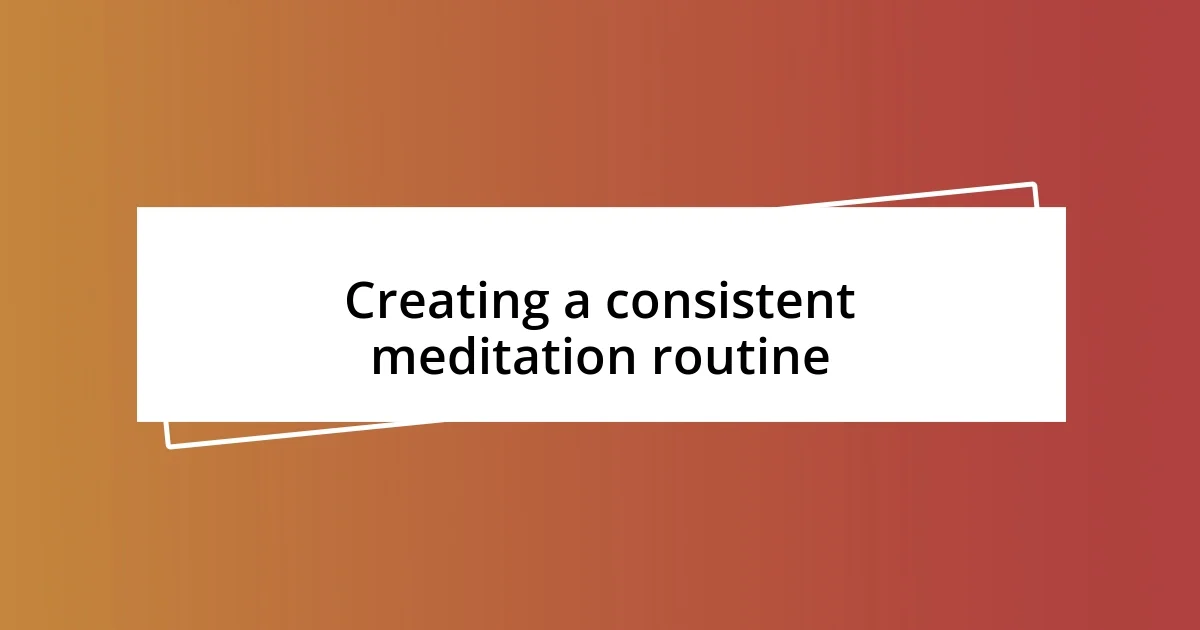
Creating a consistent meditation routine
Creating a consistent meditation routine has been a game-changer for my sleep. I started by picking a specific time each day, ideally the same time as my bedtime routine. This small change, like setting an alarm for my mind instead of my body, helped me to anticipate and prepare for meditation, slowly weaving it into the fabric of my evenings.
In the beginning, I used to treat meditation as a chore, squeezing it in wherever I could. Then I realized that lighting a candle and finding a quiet nook in my home turned my practice into something I genuinely looked forward to. Have you ever noticed how setting the right atmosphere can transform your mindset? It’s surprising what a little intention can do.
I made a commitment to start with just five minutes a day, gradually increasing the duration as I became more comfortable with the practice. This approach eased the pressure I felt and allowed me to enjoy the experience without overwhelming myself. By observing my thoughts and feelings without judgment, I began to appreciate these moments of stillness, paving the way for deeper sleep. What’s stopping you from trying a brief meditation today? Starting small can lead to profound changes.
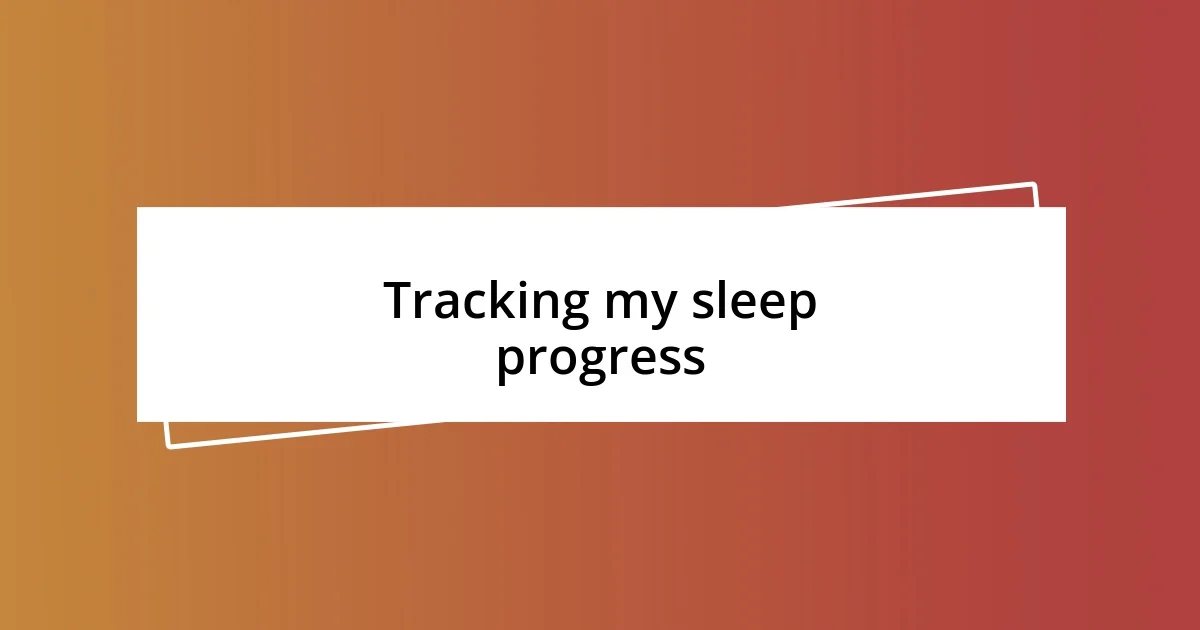
Tracking my sleep progress
Tracking my sleep progress was an eye-opening experience that turned data into motivation. I started with a simple sleep journal, jotting down when I fell asleep and when I woke up, alongside my meditation practices. Over time, I could see patterns emerging — those nights when I meditated for longer were often linked with deeper, more restful sleep. Have you ever tried keeping a journal to track your habits? Seeing your progress on paper can be incredibly satisfying and can even push you to maintain your new routine.
As I collected more data, I decided to get a sleep-tracking app to gain additional insights. I remember the first time I saw my sleep score—it felt like an exciting game. The app showed me trends, revealing how meditation before bed improved not only the length of my sleep but also its quality. I often wondered if technology could help me in my journey, and it truly did. It’s like having a personal coach cheering you on—who wouldn’t want that?
Ultimately, knowing that my progress was measurable kept me engaged. Each week, I would reflect on my sleep quality alongside my meditation habits, celebrating small victories like waking up feeling refreshed or having vivid dreams. Have you found that tracking your progress in any area makes you more committed to changes? I certainly did; the numbers became a source of motivation rather than pressure, encouraging me to continue exploring and refining my practices.
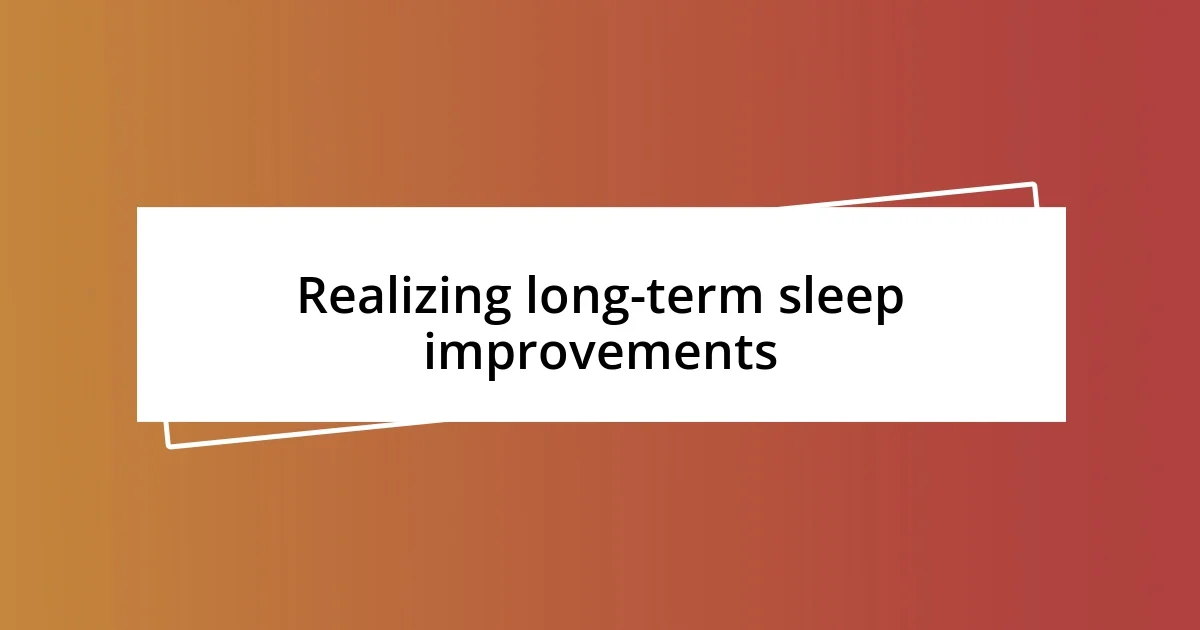
Realizing long-term sleep improvements
Realizing long-term sleep improvements took time, but I was genuinely surprised by the persistence of the benefits. One morning, I woke up feeling more rested than I had in years, something I used to take for granted. It made me reflect—how often do we overlook the simple things that, when nurtured consistently, bring about profound changes?
As weeks passed, meditation began to feel less like a task and more like a treasured part of my routine. I remember the calm that washed over me during those quiet moments. It felt almost magical to realize that I no longer woke up multiple times at night—my mind was learning to quiet and surrender to restful sleep. Have you ever experienced that blissful moment of transition between wakefulness and sleep? It’s a feeling that words often fail to capture.
I’ve also noticed that long-term meditation allowed for more mental clarity during the day. As I became more mindful, not just at bedtime, I found myself reacting more calmly to everyday stresses. It’s fascinating to think how sleep improvements ripple outward, affecting various aspects of our lives. Isn’t it intriguing how one small practice can create a chain reaction of positivity? My journey not only enhanced my sleep but enriched my entire experience of daily life.












